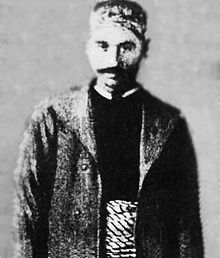Hasan al-Kharrat
| Hasan al-Kharrat حسن الخراط |
|
|---|---|

Portrait of al-Kharrat
|
|
| Born | 1861 Damascus, Syria Vilayet, Ottoman Empire |
| Died | 25 December 1925 (aged 63–64) Damascus, French Mandate of Syria |
| Nationality | Syrian |
| Occupation | Night watchman and qabaday (local youths boss) of al-Shaghour |
| Known for | Commander of Damascus and Ghouta rebels during the Great Syrian Revolt |
| Children | Fakhri |
Abu Muhammad Hasan al-Kharrat (Arabic: حسن الخراط Ḥassan al-Kharrāṭ; 1861–25 December 1925) was one of the principal Syrian rebel commanders of the Great Syrian Revolt against the French Mandate. His main area of operations was in Damascus and its Ghouta countryside. He was killed in the struggle and is considered a hero by Syrians.
As the qabaday (local youth boss) of the al-Shaghour quarter of Damascus, al-Kharrat was connected with Nasib al-Bakri, a nationalist from the quarter's most influential family. At al-Bakri's invitation, al-Kharrat joined the revolt in August 1925 and formed a group of fighters from al-Shaghour and other neighborhoods in the vicinity. He led the rebel assault against Damascus, briefly capturing the residence of French High-Commissioner Maurice Sarrail before withdrawing amid heavy French bombardment.
Towards the end of 1925, relations grew tense between al-Kharrat and other rebel leaders, particularly Sa'id al-'As and Ramadan al-Shallash, as they traded accusations of plundering villages or extorting local inhabitants. Al-Kharrat continued to lead operations in the Ghouta, where he was ultimately killed in a French ambush. The revolt dissipated by 1927, but he gained a lasting reputation as a martyr of the Syrian resistance to French rule.
Al-Kharrat was born to a Sunni Muslim family in Damascus in 1861, during Ottoman rule in Syria. He served as the night watchman of the city's al-Shaghour quarter and as a guard for the neighborhood's orchards. Damascus was captured by Arab rebels during World War I in October 1918. Afterward, the Arab Club, an Arab nationalist organization, emerged in the city to raise support for the rebels. The club assisted the rebels' leader, Emir Faisal, who formed a rudimentary government. Al-Kharrat became an affiliate of the Arab Club and raised support for Faisal in al-Shaghour. In July 1920, Faisal's government collapsed after its motley forces were defeated by the French at the Battle of Maysalun. Afterward, the French ruled Syria under the aegis of their League of Nations mandate.
...
Wikipedia
